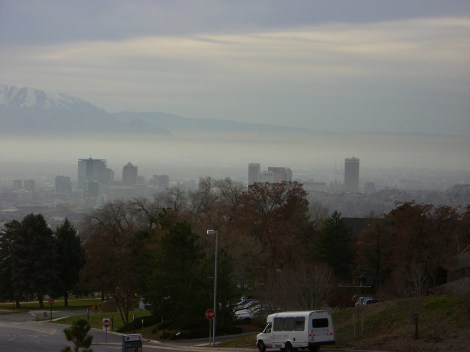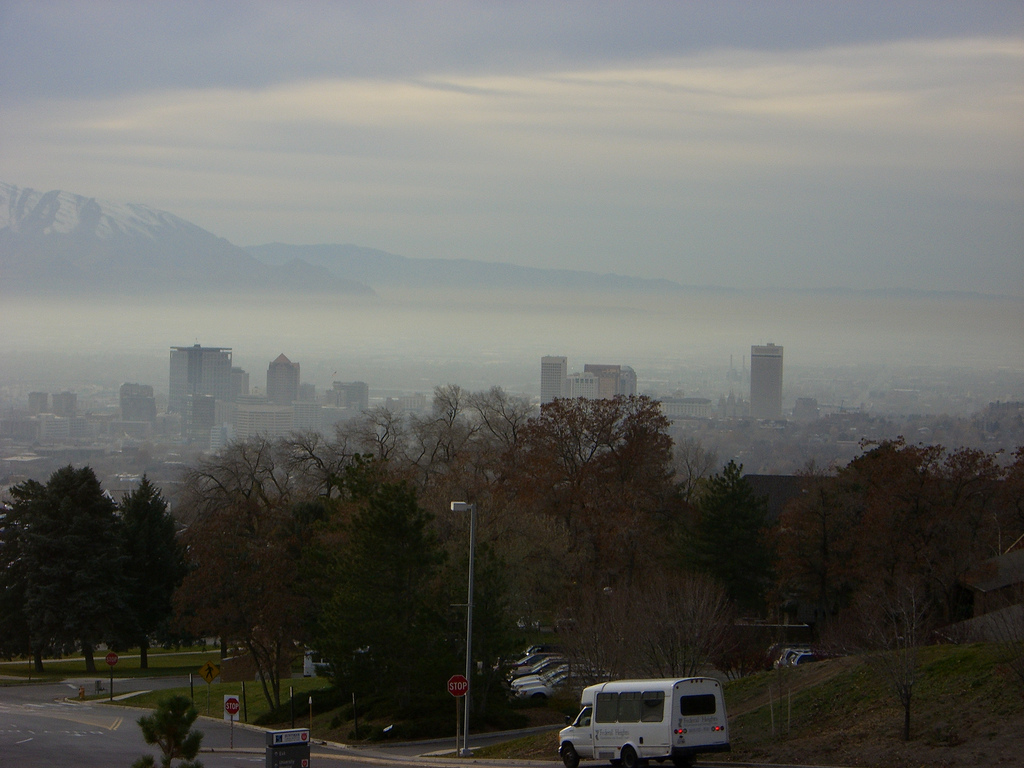Yesterday, Utah Physicians for a Healthy Environment declared that the air in Salt Lake City constituted a health emergency. From CBS News:
The U.S. Environmental Protection Agency has singled out the greater Salt Lake region as having the nation’s worst air for much of January, when an icy fog smothers mountain valleys for days or weeks at a time and traps lung-busting soot.
That’s what led more than 100 Utah doctors to petition state officials on Wednesday. They suggest lowering highway speed limits, making mass transit free for the winter and curbing industrial activities. They also call for a permanent ban on wood-burning, and want large employees to let people work from home.
Levels of soot in the air around Salt Lake City reached 130 micrograms per cubic meter — well above the EPA’s clean air standard of 35 micrograms.

aarongustafsonSmog over Salt Lake City, 2006.
Interestingly, at about the same time that the physicians group made its declaration, a (Republican!) state legislator in Utah introduced a bill targeting one key contributor to air pollution and soot: wildfires. Climate change is expected to vastly increase the number of wildfires in the state, for which Rep. Kraig Powell suggests the state should plan in advance. From The Salt Lake Tribune:
Powell … is proposing legislation, HB77, that urges the Utah Division of Forestry, Fire and State Lands to adopt pre-suppression strategies with an eye on the how climate change is already affecting wildfire in the Utah.
Scientists say climate change is already driving an increase in extreme weather-related events, such as the record-setting 2012 fire season. Higher temperatures, coupled with early spring snowmelt, dry out the soil, vegetation and trees, and fuels more and bigger wildfires.
Powell’s bill would assist the forestry and state lands office in planning for and tackling the growing wildfire activity.
Powell is embracing one of the clearest arguments for immediate action on climate change: that it saves money over the long run. Investing in preventative measures now — even measures that prevent damage from climate change as opposed to curtailing warming overall — means saving money in future years. Hurricane Sandy will end up costing the federal government $60 billion — far more than it would have cost to retrofit New York’s subway system or even to install a surge barrier at the mouth of New York Harbor. In the wake of Sandy, Republicans at the national level took a different tack than Powell, arguing solely for repair and not for prevention.
One of Powell’s inspirations was iMatter, a youth-oriented group calling for action on climate issues. The group has been active for years, including at one point suing the Utah Department of Transportation for the right to hold a protest. The Tribune last year outlined how iMatter influenced Powell:
Powell, an attorney, said he was impressed by the depth of knowledge iMatter members had, as well as their passion. …
In early meetings with Powell, iMatter members shared some of what they had learned about wildfire in Utah. For instance, they told how the state already has seen 400,000 acres burned this year with suppression costs of $47.1 million — part of a trend prompted by record hot and dry periods.
They also told how rehabilitating burned areas often costs more than fighting the wildfire itself. Their example? The 2007 Milford Flat fire which racked up a $5 million bill for suppression, while rehabilitating the scarred forest and range cost $17 million.
That’s what led to the concept for the bill …
It is not clear whether the bill will pass. In 2010, both houses of the Utah legislature approved a resolution opposing efforts to curb climate change. Since then, evidence that climate change poses short- and long-term threats to the state has only increased. Such evidence is not always enough.



